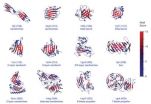(Press-News.org) Proteins are chains of amino acids that, when folded into certain structural patterns and also when unfolded, exert functions within cells. Proteins receive signals that are transmitted from one to the next and that are essential for life. However, within a given protein, are there "highways" along which the signals travel, like a in a relay event? That is to say, how is the information transmitted in a given protein? "This is one of the key questions in biophysics," says Xavier Salvatella, ICREA Professor at the Institute for Research in Biomedicine (IRB Barcelona) and head of the Molecular Biophysics Lab.
The most recent study in this field published today in Nature Communications, in collaboration with Modesto Orozco, an expert in biocomputational simulations who also works at IRB Barcelona, shows that the transmission of information over large distances occurs within proteins. This transmission has been observed and demonstrated for all proteins containing beta sheets, one of two structural patterns that folded proteins adopt.
"We are discovering the information transmission pathways inside proteins and this concept, which we have validated for one kind of protein structural motif, allows us to speculate that proteins have many valid surfaces on which a drug can act," relates Salvatella.
The team of scientists have discovered how the motions of various parts of proteins, although physically far apart, are correlated. "The same thing happens to proteins as happens to the choreography of ballet dancers, where the movements of the participants are interconnected in spite of being physically apart. If the first one lifts an arm, the last one lifts an arm too," describes the researcher.
A gold mine for drug discovery
Drugs act on a certain site or active domain of a target protein in a given disease. In most infectious diseases and in cancer, one of the problems is that the site where the drug interacts evolves and mutates and the drug is rendered inefficient. The concept, now validated by IRB Barcelona researchers, allows one to think that the site where the drug was headed is equally as valid as any other point along the transmission pathway.
"If this were this case – which is what our data show – we would be able to find many sites within the structure of a protein that would be equally or more efficient at interacting with a drug. Sites that, although lying far from the key or functional site of the protein, would have the same effect," argues Salvatella.
The scientist goes on to explain that there are already many drugs that act at sites that are not the actives sites but that these drugs have been discovered by serendipity, through massive screenings of molecules and observing that they bound to an unexpected site. "This system is clearly not efficient. We have to be able to organise it and if we manage to do this, then we will have a potent way to discover new drugs," explains the researcher.
In addition to furthering the conceptual field, Salvatella is working with proteins of biomedical interest. "We already know enough to study in parallel the pathways of proteins of biomedical interest. If we are successful, we will have discovered a gold mine for drug discovery," affirms the scientist.
The first authors of the article are the postdoctoral fellows Bryn Fenwick, a former member of Xavier Salvatella's group, currently at the Scripps Research Institute of California, and Laura Orellana, a former member of Modesto Orozco's group, who is now at the Science for Life Laboratory at the Royal Institute of Technology in Stockholm. The work has been done within the joint programme in Computational Biology between BSC, CRG and IRB Barcelona.
INFORMATION:
Reference article:
Correlated motions are a fundamental property of β-sheets
R. Bryn Fenwick, Laura Orellana, Santi Esteban-Martín, Modesto Orozco, and Xavier Salvatella
Nature Communications (2014) doi: 10.1038/ncomms5070
The transmission of information via proteins could revolutionize drug discovery
A study by the scientists Xavier Salvatella and Modesto Orozco at IRB Barcelona reveals the existence of information highways that connect and correlate distant sites within a single protein.
2014-06-12
ELSE PRESS RELEASES FROM THIS DATE:
Tiny plants ride on the coattails of migratory birds
2014-06-12
Since the days of Darwin, biologists have questioned why certain plants occur in widely separated places, the farthest reaches of North American and the Southern tip of South America but nowhere in between. How did they get there? An international team of researchers have now found an important piece of the puzzle: migratory birds about to fly to South America from the Arctic harbor small plant parts in their feathers.
In the past several decades, scientists have discovered that the North – South distributions of certain plants often result from a single jump across the ...
Chimpanzees spontaneously initiate and maintain cooperative behavior
2014-06-12
VIDEO:
Chimpanzees spontaneously cooperate with multiple partners of their choosing to remove a barrier and pull in a tray baited with food.
Click here for more information.
Without any pre-training or restrictions in partner choice among chimpanzees, researchers at the Yerkes National Primate Research Center, Emory University, found for the first time that chimpanzees housed in a socially complex, contained setting spontaneously cooperate with multiple partners of their choosing. ...
All men with gout should be routinely screened for erectile dysfunction
2014-06-12
A new study presented today at the European League Against Rheumatism Annual Congress (EULAR 2014) showed that erectile dysfunction (ED) is present in most men with gout and is frequently severe.1
In a survey of 201 men, 83 had gout, of whom a significantly greater proportion had ED (76%) compared with those patients without gout (52%) (p= 0.0007). Also, a significantly greater proportion of gout patients (43%) had severe ED compared with patients without gout (30%) (p=0.007).1
According to lead author Dr. Naomi Schlesinger, Chief, Division of Rheumatology and Professor ...
Potential anti-TNF response biomarker identified
2014-06-12
DNA methylation has been identified as a potential biomarker of response to etanercept and adalimumab in patients with rheumatoid arthritis (RA) according to preliminary results from one of the largest methylome-wide investigations of treatment response to anti-TNF therapies.1 These data, presented today at the European League Against Rheumatism Annual Congress (EULAR 2014), bring clinicians a step closer to being able to personalise a patient's treatment pathway.
Anti-TNF therapies have proved a huge advance for the treatment of rheumatoid arthritis and have transformed ...
Regular exercise beneficial in suppressing inflammation in rheumatic disease
2014-06-12
Research findings presented today at the European League Against Rheumatism Annual Congress (EULAR 2014) suggest that exercise transiently suppresses local and systemic inflammation, reinforcing the beneficial effects of exercise and the need for this to be regular in order to achieve clinical efficacy in rheumatic disease.
Chronic inflammation, swelling and pain in the joints characterise the more than 200 rheumatic diseases. Persistent inflammation over time can damage affected joints, but previous research has established that exercise can decrease joint inflammation ...
Cranial ultrasound may replace temporal artery biopsy in diagnosis of giant cell arteritis
2014-06-12
A new study presented for the first time today at the European League Against Rheumatism Annual Congress (EULAR 2014), shows that cranial ultrasound has a greater sensitivity than temporal artery biopsy,* and a comparable specificity in the diagnosis of Giant Cell Arteritis (GCA).1
Giant Cell Arteritis (GCA), a condition in which medium and large arteries mainly in the head and neck, become inflamed and narrowed, can cause blindness due to occlusion of the artery supplying the back of the eye. It is therefore essential that a prompt, accurate diagnosis of GCA is made ...
New study sheds light on what happens to 'cool' kids
2014-06-12
Teens who tried to act cool in early adolescence were more likely than their peers who didn't act cool to experience a range of problems in early adulthood, according to a new decade-long study. The study, by researchers at the University of Virginia, appears in the journal Child Development.
While cool teens are often idolized in popular media—in depictions ranging from James Dean's Rebel Without a Cause to Tina Fey's Mean Girls—seeking popularity and attention by trying to act older than one's age may not yield the expected benefits, according to the study.
Researchers ...
Toddlers whose parents use subsidies to buy center-based care more likely to enroll in Head Start
2014-06-12
Children of parents who use subsidies to purchase center-based care in the toddler years are more likely to be enrolled in Head Start or public prekindergarten in their preschool years, according to a new study. The research, conducted at Georgetown University and Columbia University, appears in the journal Child Development.
The federally funded child care subsidy program—the Child Care and Development Fund (CCDF)—serves nearly 2 million children a month and is one of the government's biggest investments in the early care and education of low-income children. While the ...
Cancer drug boosts levels of vascular-protective gene, KLF2
2014-06-12
Case Western Reserve University researchers have discovered that an existing drug used to help cancer patients has the potential to protect thousands of others from the often-deadly impact of vascular clots.
In 2008, the Food and Drug Administration approved bortezomib (Velcade) to treat multiple myeloma, which is a type of bone cancer and mantle cell lymphoma — a particularly aggressive form of non-Hodgkin lymphoma. In addition to attacking cancer cells, the drug has been shown to help prevent clot development common to many forms of the disease.
As hematologist Lalitha ...
Childhood cancer survivors hospitalized frequently years after cancer treatment
2014-06-12
PHILADELPHIA — Survivors of childhood cancers were hospitalized more often and for longer durations because of blood disorders and other problems, many years after cancer treatment was completed, compared with the general population, according to a study published in Cancer Epidemiology, Biomarkers & Prevention, a journal of the American Association for Cancer Research.
"Our findings demonstrate that childhood cancer survivors face ongoing problems that can lead to hospitalization, even for those who are decades past their original cancer diagnosis. This can negatively ...
LAST 30 PRESS RELEASES:
Scientists reveal our best- and worst-case scenarios for a warming Antarctica
Cleaner fish show intelligence typical of mammals
AABNet and partners launch landmark guide on the conservation of African livestock genetic resources and sustainable breeding strategies
Produce hydrogen and oxygen simultaneously from a single atom! Achieve carbon neutrality with an 'All-in-one' single-atom water electrolysis catalyst
Sleep loss linked to higher atrial fibrillation risk in working-age adults
Visible light-driven deracemization of α-aryl ketones synergistically catalyzed by thiophenols and chiral phosphoric acid
Most AI bots lack basic safety disclosures, study finds
How competitive gaming on discord fosters social connections
CU Anschutz School of Medicine receives best ranking in NIH funding in 20 years
Mayo Clinic opens patient information office in Cayman Islands
Phonon lasers unlock ultrabroadband acoustic frequency combs
Babies with an increased likelihood of autism may struggle to settle into deep, restorative sleep, according to a new study from the University of East Anglia.
National Reactor Innovation Center opens Molten Salt Thermophysical Examination Capability at INL
International Progressive MS Alliance awards €6.9 million to three studies researching therapies to address common symptoms of progressive MS
Can your soil’s color predict its health?
Biochar nanomaterials could transform medicine, energy, and climate solutions
Turning waste into power: scientists convert discarded phone batteries and industrial lignin into high-performance sodium battery materials
PhD student maps mysterious upper atmosphere of Uranus for the first time
Idaho National Laboratory to accelerate nuclear energy deployment with NVIDIA AI through the Genesis Mission
Blood test could help guide treatment decisions in germ cell tumors
New ‘scimitar-crested’ Spinosaurus species discovered in the central Sahara
“Cyborg” pancreatic organoids can monitor the maturation of islet cells
Technique to extract concepts from AI models can help steer and monitor model outputs
Study clarifies the cancer genome in domestic cats
Crested Spinosaurus fossil was aquatic, but lived 1,000 kilometers from the Tethys Sea
MULTI-evolve: Rapid evolution of complex multi-mutant proteins
A new method to steer AI output uncovers vulnerabilities and potential improvements
Why some objects in space look like snowmen
Flickering glacial climate may have shaped early human evolution
First AHA/ACC acute pulmonary embolism guideline: prompt diagnosis and treatment are key
[Press-News.org] The transmission of information via proteins could revolutionize drug discoveryA study by the scientists Xavier Salvatella and Modesto Orozco at IRB Barcelona reveals the existence of information highways that connect and correlate distant sites within a single protein.




